Shows
 Ciência e Conservação - DesAbraçando Árvores#vAPODN: muriqui-do-norte (Brachyteles hypoxanthus)🎙️ "Que Bicho é Esse?" - Muriqui-do-Norte 🐒🌳
Neste episódio imperdível, a Dra. Miriam Perilli recebe o Dr. Fabiano Rodrigues de Melo e a Dra. Karen Strier para uma conversa profunda sobre os fascinantes muriquis-do-norte (Brachyteles hypoxanthus) — o maior primata das Américas! 🐵💚
Conhecidos por seu comportamento pacífico e altamente social, os muriquis são verdadeiros símbolos da Mata Atlântica. Vivem em grupos cooperativos e têm uma dieta baseada principalmente em folhas, frutos e flores. Infelizmente, estão criticamente ameaçados de extinção devido à perda de habitat e ao desmatamento.
Quer entender como vivem, por que são tão especiais e o que está se...2025-05-192h 03
Ciência e Conservação - DesAbraçando Árvores#vAPODN: muriqui-do-norte (Brachyteles hypoxanthus)🎙️ "Que Bicho é Esse?" - Muriqui-do-Norte 🐒🌳
Neste episódio imperdível, a Dra. Miriam Perilli recebe o Dr. Fabiano Rodrigues de Melo e a Dra. Karen Strier para uma conversa profunda sobre os fascinantes muriquis-do-norte (Brachyteles hypoxanthus) — o maior primata das Américas! 🐵💚
Conhecidos por seu comportamento pacífico e altamente social, os muriquis são verdadeiros símbolos da Mata Atlântica. Vivem em grupos cooperativos e têm uma dieta baseada principalmente em folhas, frutos e flores. Infelizmente, estão criticamente ameaçados de extinção devido à perda de habitat e ao desmatamento.
Quer entender como vivem, por que são tão especiais e o que está se...2025-05-192h 03 People Behind the Science Podcast799: Dr. Karen Strier: Protecting the World’s Most Peaceful PrimatesDr. Karen Strier is the Vilas Research Professor and Irven Devore Professor of Anthropology at the University of Wisconsin-Madison. Karen received her B.A. in Sociology/Anthropology and Biology from Swarthmore College, and she was awarded her M.A. and Ph.D. in Anthropology from Harvard University. After completing her Ph.D., Karen served as a lecturer at Harvard University and subsequently became a faculty member at Beloit College. She joined the faculty at UW-Madison in 1989. Karen has received numerous honors and awards throughout her career, including being elected as a Fellow of the American Anthropological Association, a Fellow...2025-02-1057 min
People Behind the Science Podcast799: Dr. Karen Strier: Protecting the World’s Most Peaceful PrimatesDr. Karen Strier is the Vilas Research Professor and Irven Devore Professor of Anthropology at the University of Wisconsin-Madison. Karen received her B.A. in Sociology/Anthropology and Biology from Swarthmore College, and she was awarded her M.A. and Ph.D. in Anthropology from Harvard University. After completing her Ph.D., Karen served as a lecturer at Harvard University and subsequently became a faculty member at Beloit College. She joined the faculty at UW-Madison in 1989. Karen has received numerous honors and awards throughout her career, including being elected as a Fellow of the American Anthropological Association, a Fellow...2025-02-1057 min People Behind the Science Podcast Stories from Scientists about Science, Life, Research, and Science CareersProtecting the World's Most Peaceful Primates - Dr. Karen StrierDr. Karen Strier is the Vilas Research Professor and Irven Devore Professor of Anthropology at the University of Wisconsin-Madison. Karen is a Primate behavioral ecologist. She is working to understand the biological basis of human behavior, evolution, and adaptation by studying our closest living relatives. Research in Karen’s group involves observing a critically endangered primate, the northern muriqui, in its natural habitat to understand how their behaviors are similar to or different from human behaviors. When she’s not in the lab or observing primates in the wild, Karen enjoys being outside, going for walks in nature, cooking deli...2025-02-1057 min
People Behind the Science Podcast Stories from Scientists about Science, Life, Research, and Science CareersProtecting the World's Most Peaceful Primates - Dr. Karen StrierDr. Karen Strier is the Vilas Research Professor and Irven Devore Professor of Anthropology at the University of Wisconsin-Madison. Karen is a Primate behavioral ecologist. She is working to understand the biological basis of human behavior, evolution, and adaptation by studying our closest living relatives. Research in Karen’s group involves observing a critically endangered primate, the northern muriqui, in its natural habitat to understand how their behaviors are similar to or different from human behaviors. When she’s not in the lab or observing primates in the wild, Karen enjoys being outside, going for walks in nature, cooking deli...2025-02-1057 min Conversa com BialPedro Bial entrevista Karen StrierA primatologista americana compartilha décadas de pesquisa sobre os muriquis, primatas ameaçados de extinção, em Minas Gerais. 2024-09-0529 min
Conversa com BialPedro Bial entrevista Karen StrierA primatologista americana compartilha décadas de pesquisa sobre os muriquis, primatas ameaçados de extinção, em Minas Gerais. 2024-09-0529 min rychelrrona[DOWNLOADPDF] [PDF] Primate Behavioral Ecology Online Book**Download Primate Behavioral Ecology Full Edition,Full Version,Full Book**by Karen B. StrierReading Now at : https://happyreadingebook.club/?book=1138954365ORDOWNLOAD EBOOK NOW!Read PDF [] [PDF] Primate Behavioral Ecology Online Book Ebook Online PDF Download and Download PDF [] [PDF] Primate Behavioral Ecology Online Book Ebook Online PDF Download by Karen B. Strier [PDF] Download [] [PDF] Primate Behavioral Ecology Online Book Ebook | READ ONLINE Download [] [PDF] Primate Behavioral Ecology Online Book read ebook online PDF EPUB KINDLE Download [] [PDF] Primate Behavioral Ecology Online Book PDF...2023-10-1800 min
rychelrrona[DOWNLOADPDF] [PDF] Primate Behavioral Ecology Online Book**Download Primate Behavioral Ecology Full Edition,Full Version,Full Book**by Karen B. StrierReading Now at : https://happyreadingebook.club/?book=1138954365ORDOWNLOAD EBOOK NOW!Read PDF [] [PDF] Primate Behavioral Ecology Online Book Ebook Online PDF Download and Download PDF [] [PDF] Primate Behavioral Ecology Online Book Ebook Online PDF Download by Karen B. Strier [PDF] Download [] [PDF] Primate Behavioral Ecology Online Book Ebook | READ ONLINE Download [] [PDF] Primate Behavioral Ecology Online Book read ebook online PDF EPUB KINDLE Download [] [PDF] Primate Behavioral Ecology Online Book PDF...2023-10-1800 min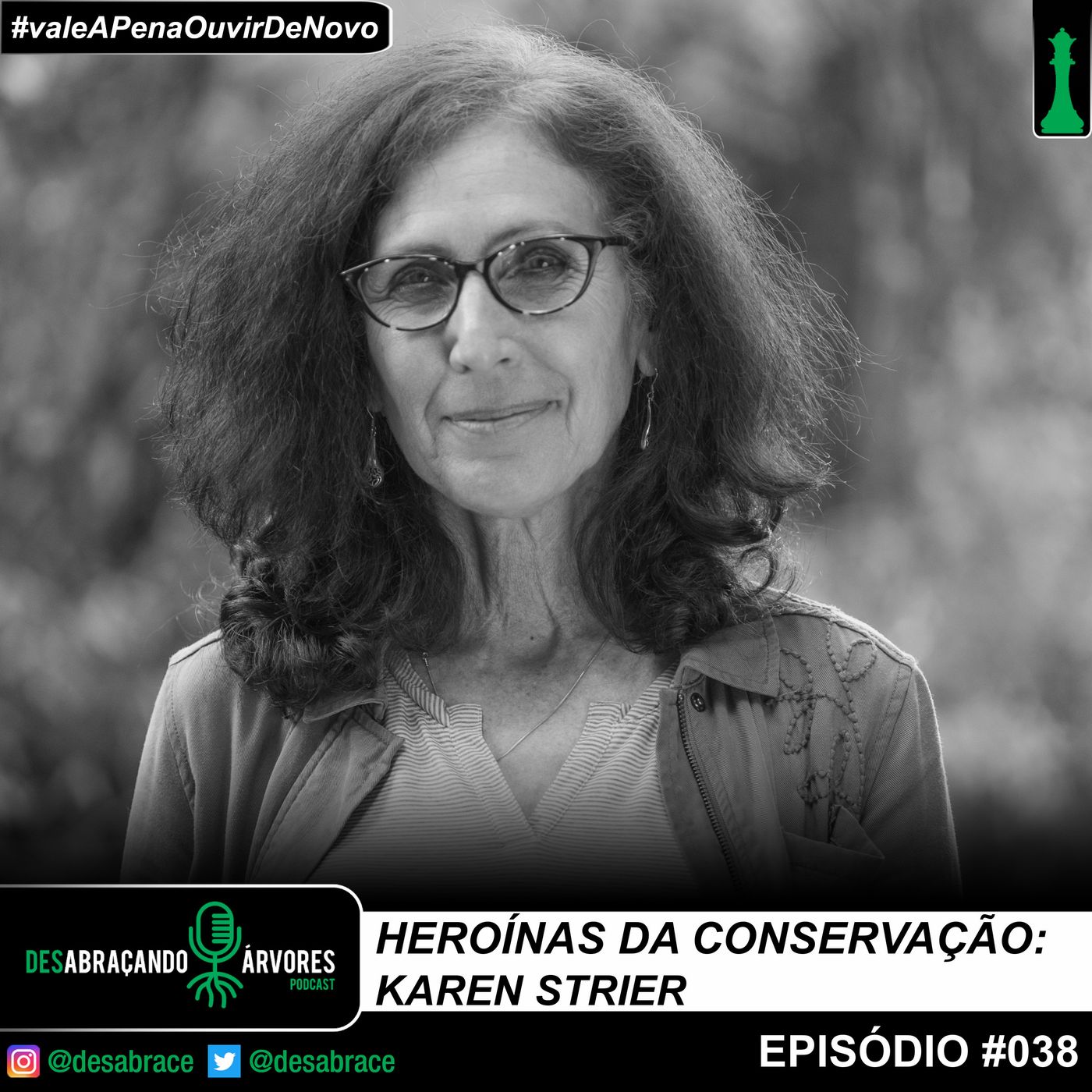 DesAbraçando Árvores#valeAPenaOuvirDeNovo – Heroínas da Conservação: Karen StrierNo #valeAPenaOuvirDeNovo de hoje trazemos o episódio em que Fernando Lima, nosso host supremo, entrevistou a grande primatóloga Karen Strier! Dá uma força para manter o DesAbraçando online e com episódios no cronograma contribuindo financeiramente com nosso projeto: O DesAbraçando é um projeto independente e conta com o apoio dos ouvintes para se manter online e pagar a edição de áudio. Se você curte o projeto, considere apoiar financeiramente. Você pode contribuir a partir de R$ 1,00 no www.apoia.se/desabrace Segue a gente lá nas redes sociais: https://www.instagram.com/desabrace/Instagram https://web.fa...2022-12-241h 05
DesAbraçando Árvores#valeAPenaOuvirDeNovo – Heroínas da Conservação: Karen StrierNo #valeAPenaOuvirDeNovo de hoje trazemos o episódio em que Fernando Lima, nosso host supremo, entrevistou a grande primatóloga Karen Strier! Dá uma força para manter o DesAbraçando online e com episódios no cronograma contribuindo financeiramente com nosso projeto: O DesAbraçando é um projeto independente e conta com o apoio dos ouvintes para se manter online e pagar a edição de áudio. Se você curte o projeto, considere apoiar financeiramente. Você pode contribuir a partir de R$ 1,00 no www.apoia.se/desabrace Segue a gente lá nas redes sociais: https://www.instagram.com/desabrace/Instagram https://web.fa...2022-12-241h 05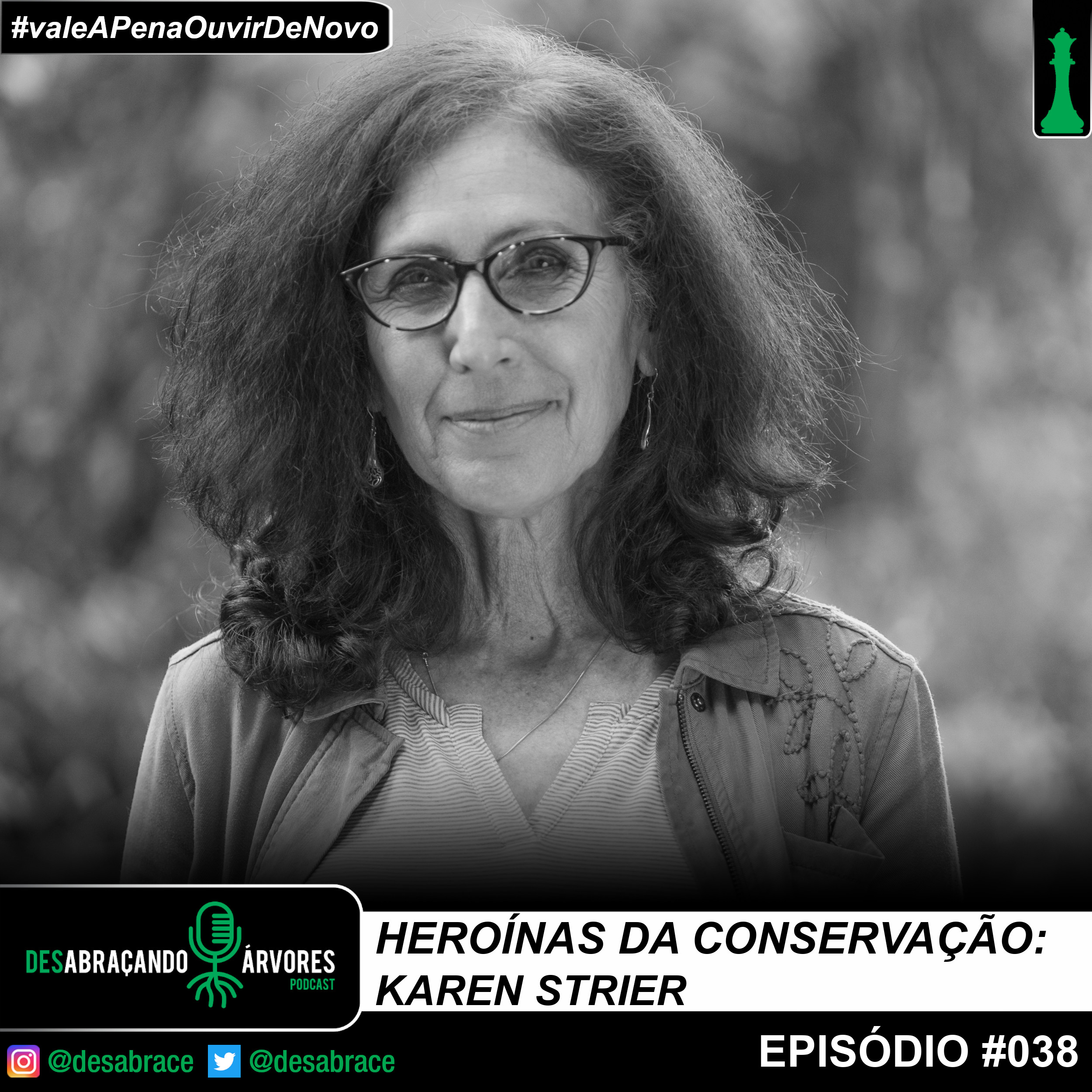 Ciência e Conservação - DesAbraçando Árvores#vAPODN: Heroínas da Conservação: Karen StrierNo #valeAPenaOuvirDeNovo de hoje trazemos o episódio em que Fernando Lima, nosso host supremo, entrevistou a grande primatóloga Karen Strier!
Dá uma força para manter o DesAbraçando online e com episódios no cronograma contribuindo financeiramente com nosso projeto:
O DesAbraçando é um projeto independente e conta com o apoio dos ouvintes para se manter online e pagar a edição de áudio. Se você curte o projeto, considere apoiar financeiramente. Você pode contribuir a partir de R$ 1,00 no www.apoia.se/desabrace
Segue a gente lá nas redes sociais:
https://www.instagram.com/desabrace/Instagram
https://web.fa...2022-12-241h 05
Ciência e Conservação - DesAbraçando Árvores#vAPODN: Heroínas da Conservação: Karen StrierNo #valeAPenaOuvirDeNovo de hoje trazemos o episódio em que Fernando Lima, nosso host supremo, entrevistou a grande primatóloga Karen Strier!
Dá uma força para manter o DesAbraçando online e com episódios no cronograma contribuindo financeiramente com nosso projeto:
O DesAbraçando é um projeto independente e conta com o apoio dos ouvintes para se manter online e pagar a edição de áudio. Se você curte o projeto, considere apoiar financeiramente. Você pode contribuir a partir de R$ 1,00 no www.apoia.se/desabrace
Segue a gente lá nas redes sociais:
https://www.instagram.com/desabrace/Instagram
https://web.fa...2022-12-241h 05 BionotePodcast 60 – Retrospectiva 2022
Este é o último Bionote do ano e viemos com um presente para os nossos ouvintes! Trouxemos um review dos episódios que foram gravados em 2022. Neste ano, nos dedicamos a trazer nos nossos episódios um pouco sobre a importância da conservação da biodiversidade.Em fevereiro, viemos com uma tradição do Bionote: nosso tema foi o trabalho de Darwin e convidamos o Prof. Henrique Paprocki.No mês de março, o tema do Bionote foi a importância das RPPN’s e trouxemos dois amantes da natureza donos da RPPN Aves Gerais: Lucas Aguiar Carrara...2022-12-211h 10
BionotePodcast 60 – Retrospectiva 2022
Este é o último Bionote do ano e viemos com um presente para os nossos ouvintes! Trouxemos um review dos episódios que foram gravados em 2022. Neste ano, nos dedicamos a trazer nos nossos episódios um pouco sobre a importância da conservação da biodiversidade.Em fevereiro, viemos com uma tradição do Bionote: nosso tema foi o trabalho de Darwin e convidamos o Prof. Henrique Paprocki.No mês de março, o tema do Bionote foi a importância das RPPN’s e trouxemos dois amantes da natureza donos da RPPN Aves Gerais: Lucas Aguiar Carrara...2022-12-211h 10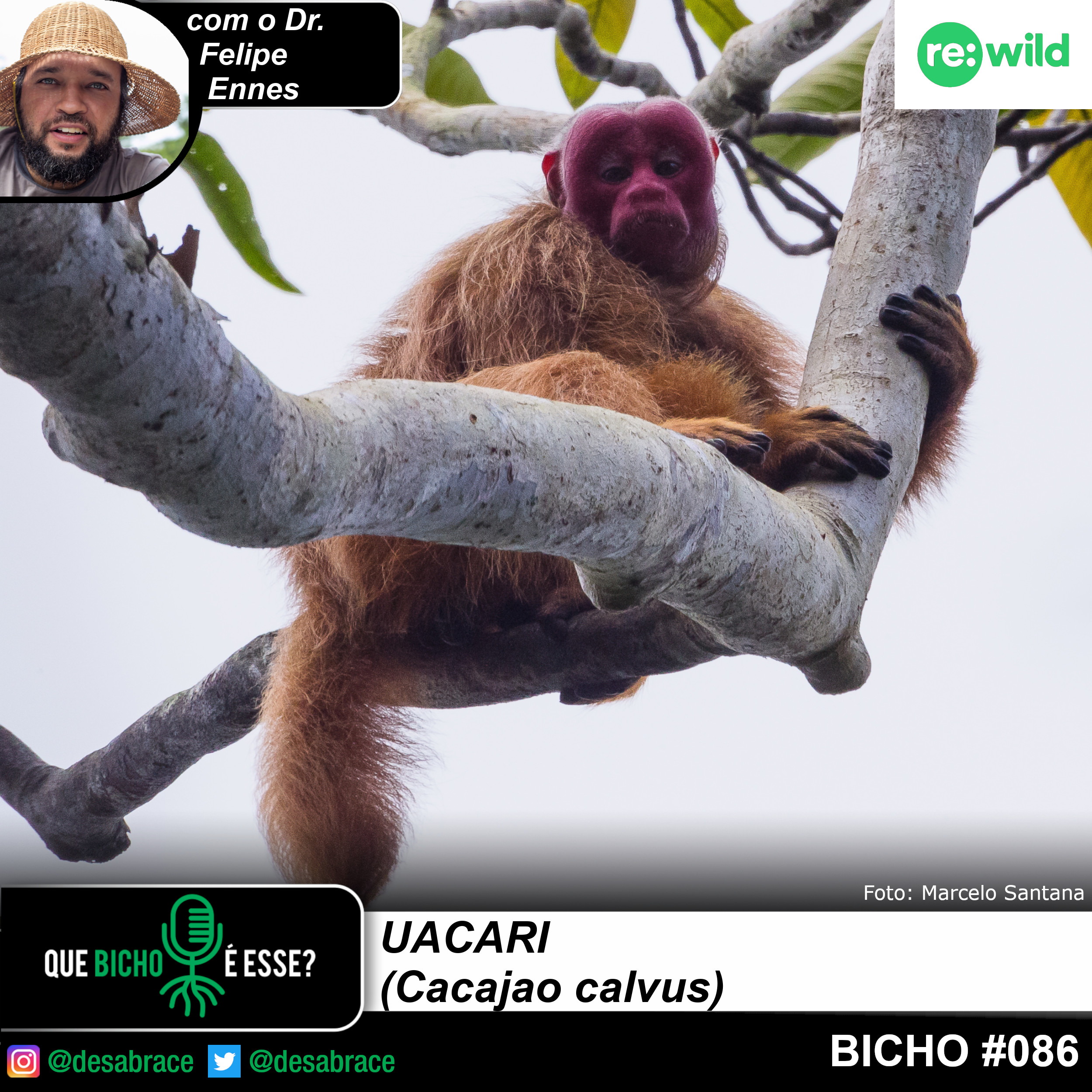 Ciência e Conservação - DesAbraçando ÁrvoresBicho #086: uacari (Cacajao calvus)Olá! Bem vindos a mais um “Que bicho é esse?”, eu sou a Miriam Perilli e o episódio de hoje é sobre um animal interessantíssimo: o uacari (Cacajao calvus).
Esse é um episódio especial por ser o nosso último da nossa série sobre primatas, que contou com o apoio fundamental da Re-Wild!
Foram ao todo 11 episódios! Na primeira fase nós gravamos 3 episódio super especiais sobre a história da primatologia no Brasil e contamos com as presenças de nomes ilustres dos Drs Russel Mittermeier, Anthony Rylands, Leandro Jeruzalinsky, Fabiano Rodrigues de Melo e Claudio Padua.
Na sequência nós f...2022-11-131h 08
Ciência e Conservação - DesAbraçando ÁrvoresBicho #086: uacari (Cacajao calvus)Olá! Bem vindos a mais um “Que bicho é esse?”, eu sou a Miriam Perilli e o episódio de hoje é sobre um animal interessantíssimo: o uacari (Cacajao calvus).
Esse é um episódio especial por ser o nosso último da nossa série sobre primatas, que contou com o apoio fundamental da Re-Wild!
Foram ao todo 11 episódios! Na primeira fase nós gravamos 3 episódio super especiais sobre a história da primatologia no Brasil e contamos com as presenças de nomes ilustres dos Drs Russel Mittermeier, Anthony Rylands, Leandro Jeruzalinsky, Fabiano Rodrigues de Melo e Claudio Padua.
Na sequência nós f...2022-11-131h 08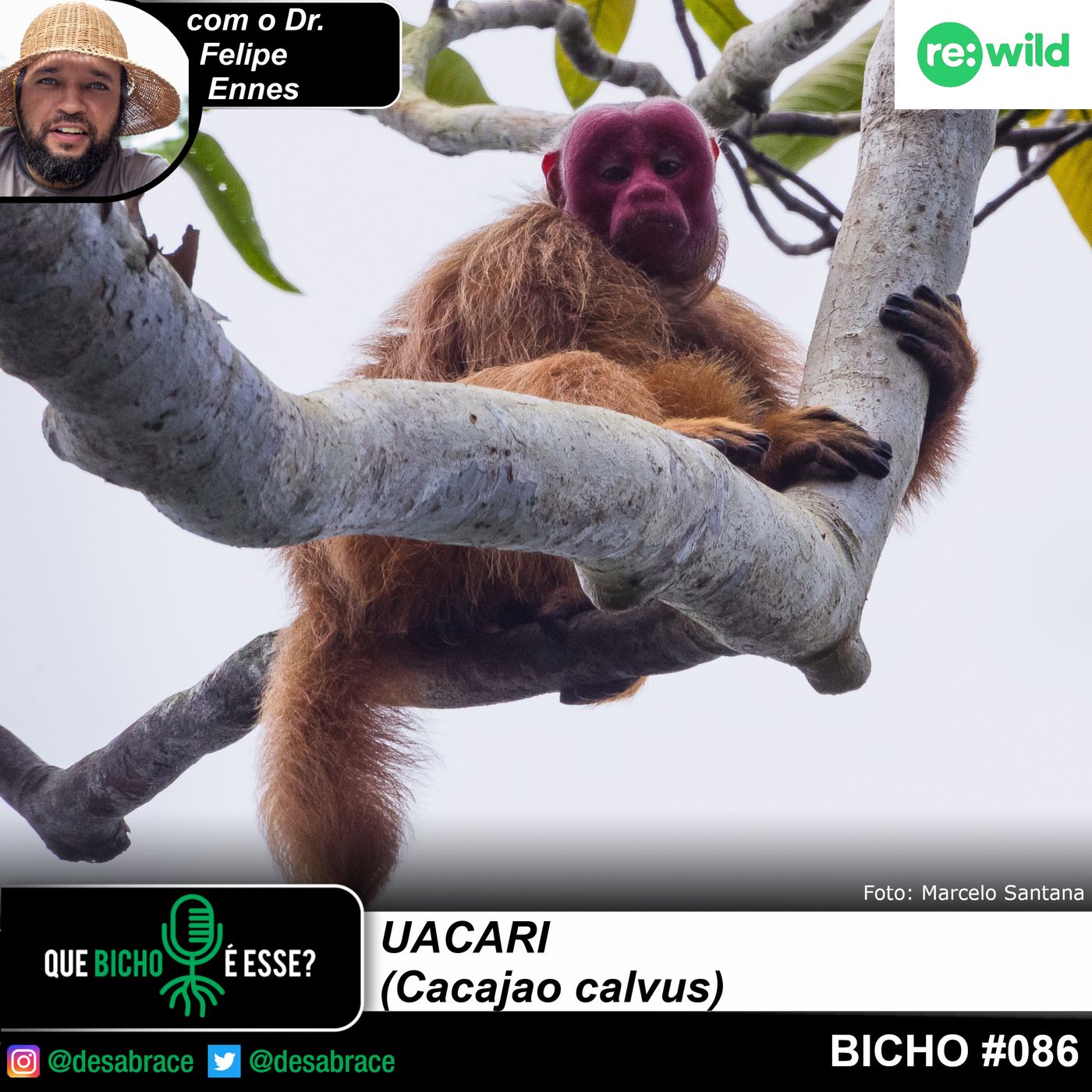 DesAbraçando ÁrvoresBicho #086 – uacari (Cacajao calvus)Olá! Bem vindos a mais um “Que bicho é esse?”, eu sou a Miriam Perilli e o episódio de hoje é sobre um animal interessantíssimo: o uacari (Cacajao calvus). Esse é um episódio especial por ser o nosso último da nossa série sobre primatas, que contou com o apoio fundamental da Re-Wild! Foram ao todo 11 episódios! Na primeira fase nós gravamos 3 episódio super especiais sobre a história da primatologia no Brasil e contamos com as presenças de nomes ilustres dos Drs Russel Mittermeier, Anthony Rylands, Leandro Jeruzalinsky, Fabiano Rodrigues de Melo e Claudio Padua. Na sequência nós f...2022-11-131h 08
DesAbraçando ÁrvoresBicho #086 – uacari (Cacajao calvus)Olá! Bem vindos a mais um “Que bicho é esse?”, eu sou a Miriam Perilli e o episódio de hoje é sobre um animal interessantíssimo: o uacari (Cacajao calvus). Esse é um episódio especial por ser o nosso último da nossa série sobre primatas, que contou com o apoio fundamental da Re-Wild! Foram ao todo 11 episódios! Na primeira fase nós gravamos 3 episódio super especiais sobre a história da primatologia no Brasil e contamos com as presenças de nomes ilustres dos Drs Russel Mittermeier, Anthony Rylands, Leandro Jeruzalinsky, Fabiano Rodrigues de Melo e Claudio Padua. Na sequência nós f...2022-11-131h 08 Que bicho é esse?Bicho #086 - uacari (Cacajao calvus)Olá! Bem vindos a mais um “Que bicho é esse?”, eu sou a Miriam Perilli e o episódio de hoje é sobre um animal interessantíssimo: o uacari (Cacajao calvus).
Esse é um episódio especial por ser o nosso último da nossa série sobre primatas, que contou com o apoio fundamental da Re-Wild!
Foram ao todo 11 episódios! Na primeira fase nós gravamos 3 episódio super especiais sobre a história da primatologia no Brasil e contamos com as presenças de nomes ilustres dos Drs Russel Mittermeier, Anthony Rylands, Leandro Jeruzalinsky, Fabiano Rodrigues de Melo e Claudio...2022-11-131h 08
Que bicho é esse?Bicho #086 - uacari (Cacajao calvus)Olá! Bem vindos a mais um “Que bicho é esse?”, eu sou a Miriam Perilli e o episódio de hoje é sobre um animal interessantíssimo: o uacari (Cacajao calvus).
Esse é um episódio especial por ser o nosso último da nossa série sobre primatas, que contou com o apoio fundamental da Re-Wild!
Foram ao todo 11 episódios! Na primeira fase nós gravamos 3 episódio super especiais sobre a história da primatologia no Brasil e contamos com as presenças de nomes ilustres dos Drs Russel Mittermeier, Anthony Rylands, Leandro Jeruzalinsky, Fabiano Rodrigues de Melo e Claudio...2022-11-131h 08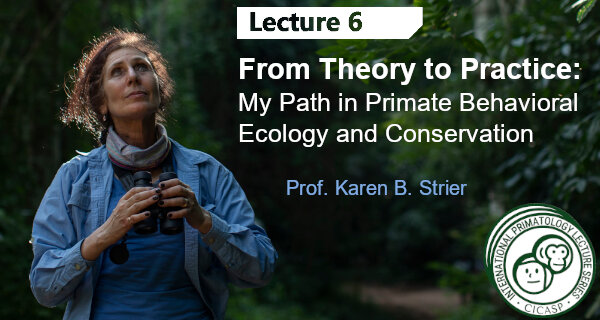 The PrimateCastThe PrimateCast #70: Dr. Karen Strier on weaving between theory and practice in behavioral ecology and conservationIn this installment of The PrimateCast we continue with our International Primatology Lecture Series: Past, Present and Future Perspectives of the Field.
The IPLS is dedicated to providing origin stories about experienced...2022-08-2000 min
The PrimateCastThe PrimateCast #70: Dr. Karen Strier on weaving between theory and practice in behavioral ecology and conservationIn this installment of The PrimateCast we continue with our International Primatology Lecture Series: Past, Present and Future Perspectives of the Field.
The IPLS is dedicated to providing origin stories about experienced...2022-08-2000 min The PrimateCastWeaving between theory and practice in behavioral ecology and conservation with Dr. Karen StrierSend us a textThis episode of The PrimateCast: Origins is taken from CICASP's International Primatology Lecture Series: Past, Present and Future Perspectives of the Field.The IPLS is dedicated to providing origin stories told by experienced researchers in primatology and related fields. The lectures are conducted via Zoom within our CICASP Seminar in Science Communication for graduate students of our program, but we decided to release the audio right here on The PrimateCast.For anyone interested in viewing the video versions of these lectures, head over to CICASP's YouTube channel...2022-08-201h 16
The PrimateCastWeaving between theory and practice in behavioral ecology and conservation with Dr. Karen StrierSend us a textThis episode of The PrimateCast: Origins is taken from CICASP's International Primatology Lecture Series: Past, Present and Future Perspectives of the Field.The IPLS is dedicated to providing origin stories told by experienced researchers in primatology and related fields. The lectures are conducted via Zoom within our CICASP Seminar in Science Communication for graduate students of our program, but we decided to release the audio right here on The PrimateCast.For anyone interested in viewing the video versions of these lectures, head over to CICASP's YouTube channel...2022-08-201h 16 BionotePodcast 53 – O Mundo dos Muriquis!
Hoje tem episódio do Bionote Podcast!
O Bionote deste mês está espetacular e com uma energia maravilhosa!! Temos a participação especial de dois pesquisadores brilhantes, Karen Strier e Fabiano Melo. Vamos falar sobre o Mundo dos Muriquis, uma espécie endêmica da Mata Atlântica que está criticamente ameaçada de extinção.
Neste episódio falaremos sobre a historia natural, aspectos reprodutivos, sociais e os desafios nas estratégias de conservação da espécie.
Você vai aprender isso e muito mais com dois pesquisadores competentes!! A Karen Strier é antropólo...2022-05-2850 min
BionotePodcast 53 – O Mundo dos Muriquis!
Hoje tem episódio do Bionote Podcast!
O Bionote deste mês está espetacular e com uma energia maravilhosa!! Temos a participação especial de dois pesquisadores brilhantes, Karen Strier e Fabiano Melo. Vamos falar sobre o Mundo dos Muriquis, uma espécie endêmica da Mata Atlântica que está criticamente ameaçada de extinção.
Neste episódio falaremos sobre a historia natural, aspectos reprodutivos, sociais e os desafios nas estratégias de conservação da espécie.
Você vai aprender isso e muito mais com dois pesquisadores competentes!! A Karen Strier é antropólo...2022-05-2850 min Ciência e Conservação - DesAbraçando ÁrvoresBicho #069: muriqui-do-norte (Brachyteles hypoxanthus)Após um pequeno hiato o Que bicho é esse? está de volta!
Neste episódio a Dra. Miriam Perilli recebe o Dr. Fabiano Rodrigues de Melo e a Dra. Karen Strier para falar sobre os fascinantes muriquis-do-norte!
Saiba tudo sobre o maior primata das Américas!
Este é o primeiro de nossa série sobre alguns dos primatas mais ameaçados da Mata Atlântica.
Esta série conta com o apoio da Re:wild - Biodiversity is the solution https://www.rewild.org/
A Primatologia no Brasil:
https://open.spotify.com/episode/3zAzZ7EUjWluj64yeXA478?si=7f9c2f67490a429f
https...2021-11-142h 03
Ciência e Conservação - DesAbraçando ÁrvoresBicho #069: muriqui-do-norte (Brachyteles hypoxanthus)Após um pequeno hiato o Que bicho é esse? está de volta!
Neste episódio a Dra. Miriam Perilli recebe o Dr. Fabiano Rodrigues de Melo e a Dra. Karen Strier para falar sobre os fascinantes muriquis-do-norte!
Saiba tudo sobre o maior primata das Américas!
Este é o primeiro de nossa série sobre alguns dos primatas mais ameaçados da Mata Atlântica.
Esta série conta com o apoio da Re:wild - Biodiversity is the solution https://www.rewild.org/
A Primatologia no Brasil:
https://open.spotify.com/episode/3zAzZ7EUjWluj64yeXA478?si=7f9c2f67490a429f
https...2021-11-142h 03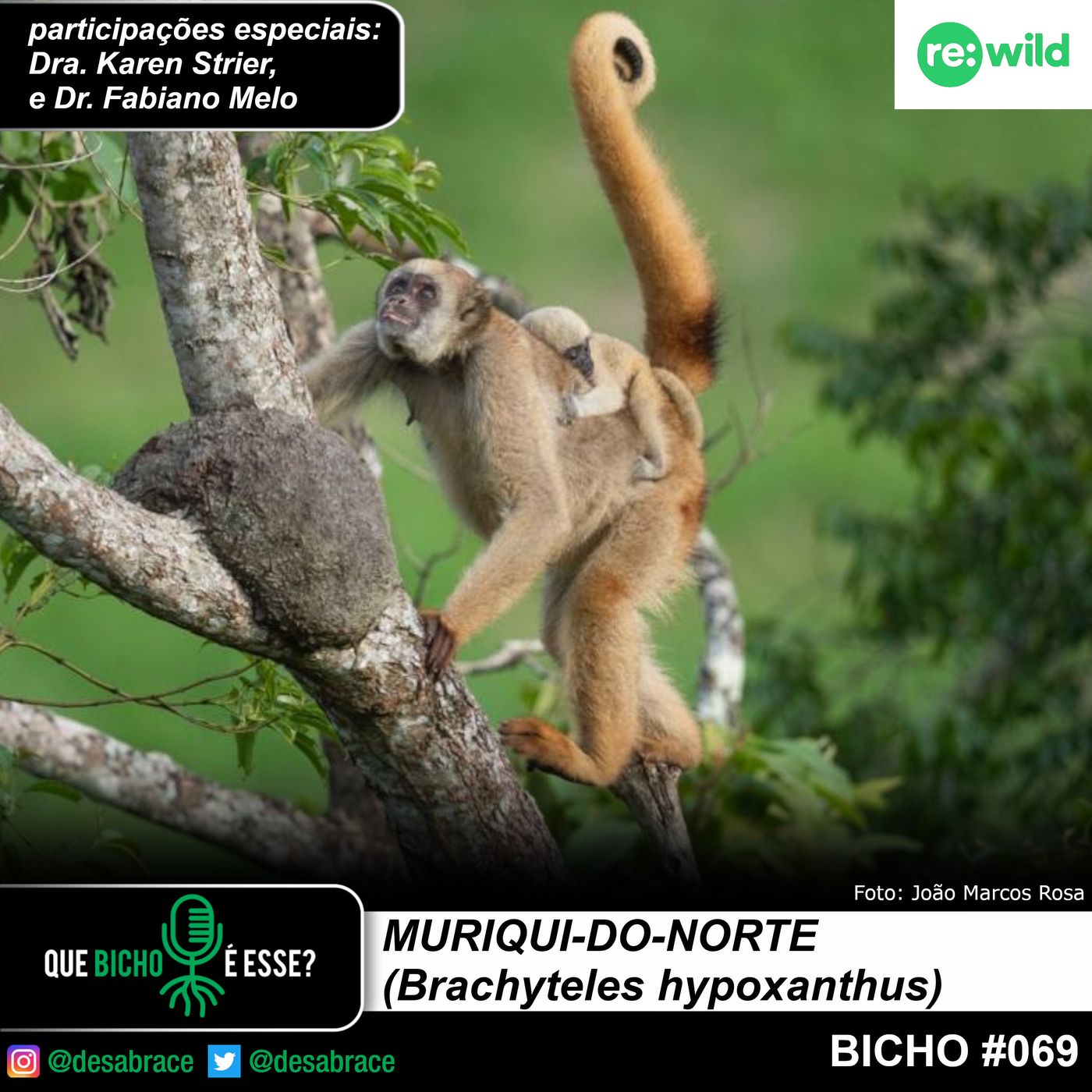 DesAbraçando ÁrvoresBicho #069: muriqui-do-norte (Brachyteles hypoxanthus)Após um pequeno hiato o Que bicho é esse? está de volta! Neste episódio a Dra. Miriam Perilli recebe o Dr. Fabiano Rodrigues de Melo e a Dra. Karen Strier para falar sobre os fascinantes muriquis-do-norte! Saiba tudo sobre o maior primata das Américas! Este é o primeiro de nossa série sobre alguns dos primatas mais ameaçados da Mata Atlântica. Esta série conta com o apoio da Re:wild - Biodiversity is the solution https://www.rewild.org/ A Primatologia no Brasil: https://open.spotify.com/episode/3zAzZ7EUjWluj64yeXA478?si=7f9c2f67490a429f https...2021-11-142h 03
DesAbraçando ÁrvoresBicho #069: muriqui-do-norte (Brachyteles hypoxanthus)Após um pequeno hiato o Que bicho é esse? está de volta! Neste episódio a Dra. Miriam Perilli recebe o Dr. Fabiano Rodrigues de Melo e a Dra. Karen Strier para falar sobre os fascinantes muriquis-do-norte! Saiba tudo sobre o maior primata das Américas! Este é o primeiro de nossa série sobre alguns dos primatas mais ameaçados da Mata Atlântica. Esta série conta com o apoio da Re:wild - Biodiversity is the solution https://www.rewild.org/ A Primatologia no Brasil: https://open.spotify.com/episode/3zAzZ7EUjWluj64yeXA478?si=7f9c2f67490a429f https...2021-11-142h 03 Que bicho é esse?Bicho #069: muriqui-do-norte (Brachyteles hypoxanthus)Após um pequeno hiato o Que bicho é esse? está de volta!
Neste episódio a Dra. Miriam Perilli recebe o Dr. Fabiano Rodrigues de Melo e a Dra. Karen Strier para falar sobre os fascinantes muriquis-do-norte!
Saiba tudo sobre o maior primata das Américas!
Este é o primeiro de nossa série sobre alguns dos primatas mais ameaçados da Mata Atlântica.
Esta série conta com o apoio da Re:wild - Biodiversity is the solution https://www.rewild.org/
A Primatologia no Brasil:
https://op...2021-11-142h 03
Que bicho é esse?Bicho #069: muriqui-do-norte (Brachyteles hypoxanthus)Após um pequeno hiato o Que bicho é esse? está de volta!
Neste episódio a Dra. Miriam Perilli recebe o Dr. Fabiano Rodrigues de Melo e a Dra. Karen Strier para falar sobre os fascinantes muriquis-do-norte!
Saiba tudo sobre o maior primata das Américas!
Este é o primeiro de nossa série sobre alguns dos primatas mais ameaçados da Mata Atlântica.
Esta série conta com o apoio da Re:wild - Biodiversity is the solution https://www.rewild.org/
A Primatologia no Brasil:
https://op...2021-11-142h 03 Plants of the Gods: Hallucinogens, Healing, Culture and Conservation podcastPlants of the Gods: S2E9. The Plants of the Apes - How Animals Use Medicinal Plants. Part 1We have all seen dogs eat grass to alleviate illnesses; why would we not think that other animals do not consume other plants for therapeutic purposes? In fact, it was the great Jane Goodall and other colleagues in East Africa who recorded chimps and even elephants eating medicinal plants. This episode ranges from Tanzania to eastern Brazil to Wisconsin to document animals' use of medicinal and even toxic plants. Acosta, William. Bombardier Beetles and Fever Trees: A Close-up Look at Chemical Warfare and Signals in Animals and Plants. Addison-Wesley, 1997. Cowen, Ron. “Medicine on the...2021-10-2720 min
Plants of the Gods: Hallucinogens, Healing, Culture and Conservation podcastPlants of the Gods: S2E9. The Plants of the Apes - How Animals Use Medicinal Plants. Part 1We have all seen dogs eat grass to alleviate illnesses; why would we not think that other animals do not consume other plants for therapeutic purposes? In fact, it was the great Jane Goodall and other colleagues in East Africa who recorded chimps and even elephants eating medicinal plants. This episode ranges from Tanzania to eastern Brazil to Wisconsin to document animals' use of medicinal and even toxic plants. Acosta, William. Bombardier Beetles and Fever Trees: A Close-up Look at Chemical Warfare and Signals in Animals and Plants. Addison-Wesley, 1997. Cowen, Ron. “Medicine on the...2021-10-2720 min The Plants of the Gods podcastPlants of the Gods: S2E9. The Plants of the Apes - How Animals Use Medicinal Plants. Part 1We have all seen dogs eat grass to alleviate illnesses; why would we not think that other animals do not consume other plants for therapeutic purposes? In fact, it was the great Jane Goodall and other colleagues in East Africa who recorded chimps and even elephants eating medicinal plants. This episode ranges from Tanzania to eastern Brazil to Wisconsin to document animals' use of medicinal and even toxic plants. Acosta, William. Bombardier Beetles and Fever Trees: A Close-up Look at Chemical Warfare and Signals in Animals and Plants. Addison-Wesley, 1997. Cowen, Ron. “Medicine on the...2021-10-2720 min
The Plants of the Gods podcastPlants of the Gods: S2E9. The Plants of the Apes - How Animals Use Medicinal Plants. Part 1We have all seen dogs eat grass to alleviate illnesses; why would we not think that other animals do not consume other plants for therapeutic purposes? In fact, it was the great Jane Goodall and other colleagues in East Africa who recorded chimps and even elephants eating medicinal plants. This episode ranges from Tanzania to eastern Brazil to Wisconsin to document animals' use of medicinal and even toxic plants. Acosta, William. Bombardier Beetles and Fever Trees: A Close-up Look at Chemical Warfare and Signals in Animals and Plants. Addison-Wesley, 1997. Cowen, Ron. “Medicine on the...2021-10-2720 min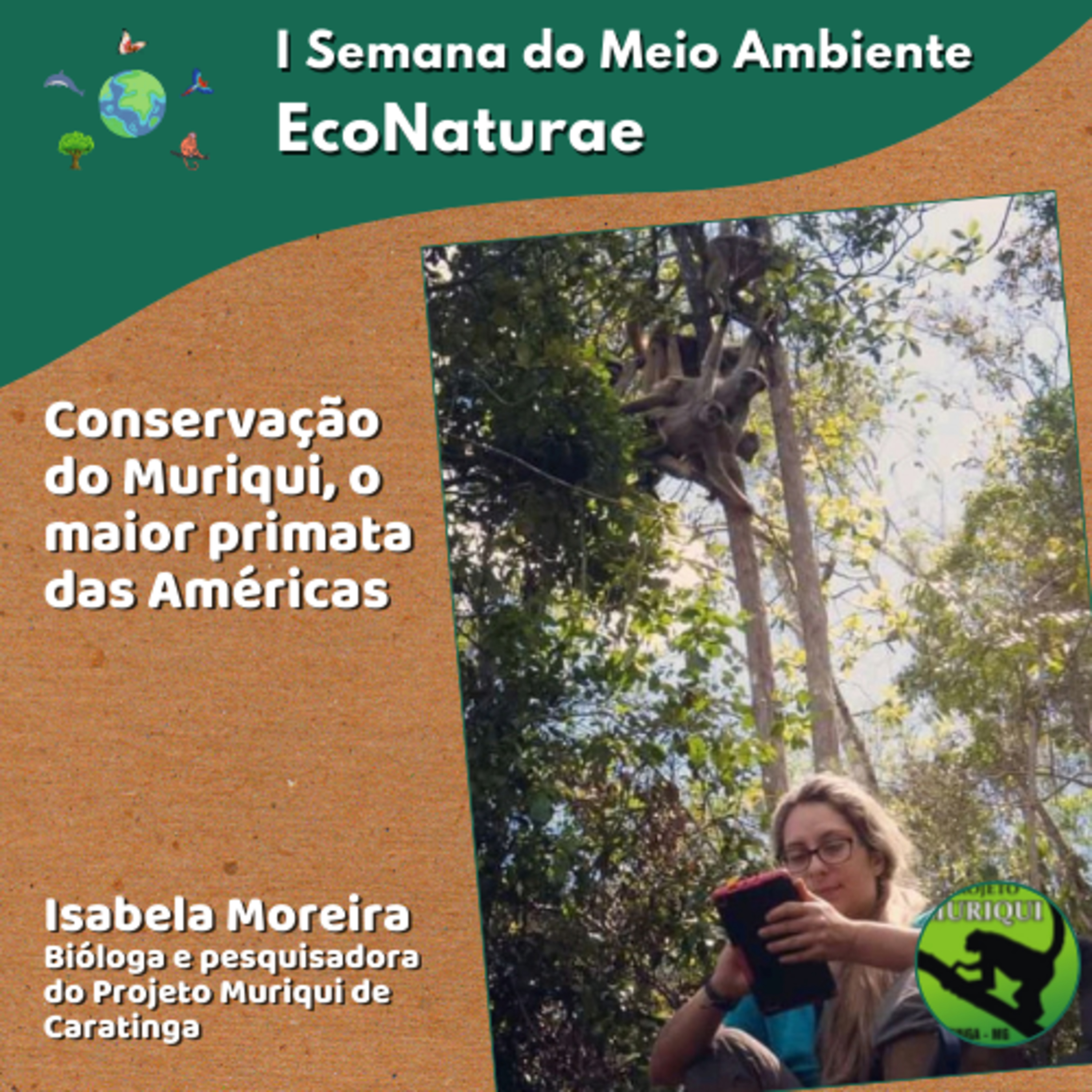 EcoNaturae - Educação AmbientalConservação do Muriqui, o maior primata das Américas com Isabela Moreira - I SMA EcoNaturae #005Essa é a versão podcast da I Semana do Meio Ambiente EcoNaturae, onde convidamos diferentes iniciativas relacionadas à conservação para compartilhar sua experiência conosco.
Nesta palestra recebemos a Isabela Moreira, que é graduada em Ciências Biológicas pela Universidade Federal de Lavras e pesquisadora do Projeto Muriqui de Caratinga. Nesta palestra ela vai falar sobre primatas e o Projeto Muriqui de Caratinga, um projeto com quase 40 anos de existência e coordenado pela Dra. Karen Strier.
► ACESSE NOSSO SITE PARA MAIS INFORMAÇÕES DO ECONATURAE:
...2021-09-031h 02
EcoNaturae - Educação AmbientalConservação do Muriqui, o maior primata das Américas com Isabela Moreira - I SMA EcoNaturae #005Essa é a versão podcast da I Semana do Meio Ambiente EcoNaturae, onde convidamos diferentes iniciativas relacionadas à conservação para compartilhar sua experiência conosco.
Nesta palestra recebemos a Isabela Moreira, que é graduada em Ciências Biológicas pela Universidade Federal de Lavras e pesquisadora do Projeto Muriqui de Caratinga. Nesta palestra ela vai falar sobre primatas e o Projeto Muriqui de Caratinga, um projeto com quase 40 anos de existência e coordenado pela Dra. Karen Strier.
► ACESSE NOSSO SITE PARA MAIS INFORMAÇÕES DO ECONATURAE:
...2021-09-031h 02 Ciência e Conservação - DesAbraçando Árvores#069 – Heroínas da Conservação: Rosa Lemos de SáNeste episódio Dr. Fernando Lima entrevista uma das pioneiras do movimento conservacionista brasileiro: Dra. Rosa Lemos de Sá!
Dá uma força para manter o DesAbraçando online e com episódios no cronograma contribuindo financeiramente com nosso projeto:
O DesAbraçando é um projeto independente e conta com o apoio dos ouvintes para se manter online e pagar a edição de áudio.
Se você curte o projeto, considere apoiar financeiramente.
Você pode contribuir a partir de R$ 1,00 no Catarse ou no Padrim.
Segue a gente lá nas redes sociais:
Instagram
Facebook
Twitter
Telegram
Visite nossa página:
DesAbraçando Árvores
...2021-08-011h 29
Ciência e Conservação - DesAbraçando Árvores#069 – Heroínas da Conservação: Rosa Lemos de SáNeste episódio Dr. Fernando Lima entrevista uma das pioneiras do movimento conservacionista brasileiro: Dra. Rosa Lemos de Sá!
Dá uma força para manter o DesAbraçando online e com episódios no cronograma contribuindo financeiramente com nosso projeto:
O DesAbraçando é um projeto independente e conta com o apoio dos ouvintes para se manter online e pagar a edição de áudio.
Se você curte o projeto, considere apoiar financeiramente.
Você pode contribuir a partir de R$ 1,00 no Catarse ou no Padrim.
Segue a gente lá nas redes sociais:
Instagram
Facebook
Twitter
Telegram
Visite nossa página:
DesAbraçando Árvores
...2021-08-011h 29 Mulheres na ConservaçãoEspecial - O que a natureza pode nos ensinar?“O que a natureza pode nos ensinar?” será o tema da próxima live da Fundação Toyota e do projeto Mulheres na Conservação.
O bate-papo no dia 1º de setembro às 17h, terá a participação da jornalista Paulina Chamorro e do fotógrafo João Marcos Rosa - idealizadores do projeto Mulheres na Conservação, da pesquisadora Karen Strier e da presidente da Fundação Toyota do Brasil, Viviane Mansi.
---
Send in a voice message: https://podcasters.spotify.com/pod/show/mulheres-na-conservacao/message2020-11-181h 01
Mulheres na ConservaçãoEspecial - O que a natureza pode nos ensinar?“O que a natureza pode nos ensinar?” será o tema da próxima live da Fundação Toyota e do projeto Mulheres na Conservação.
O bate-papo no dia 1º de setembro às 17h, terá a participação da jornalista Paulina Chamorro e do fotógrafo João Marcos Rosa - idealizadores do projeto Mulheres na Conservação, da pesquisadora Karen Strier e da presidente da Fundação Toyota do Brasil, Viviane Mansi.
---
Send in a voice message: https://podcasters.spotify.com/pod/show/mulheres-na-conservacao/message2020-11-181h 01 Ciência e Conservação - DesAbraçando Árvores#038 – Heroínas da Conservação: Karen StrierNeste episódio Fernando Lima, nosso host supremo, entrevista uma das maiores primatólogas do mundo: Karen Strier!
----------
Dá uma força para manter o DesAbraçando online e com episódios no cronograma contribuindo financeiramente com nosso projeto no
Padrim: https://www.padrim.com.br/desabrace
----------
Segue a gente lá nas redes sociais:
Instagram: https://www.instagram.com/desabrace/
Facebook: https://web.facebook.com/desabrace/
Twitter: https://twitter.com/desabrace
Telegram: https://t.me/desabrace
----------
Entre para o grupo de ouvintes do DesAbraçando no whatsapp: https://chat.whatsapp.com/LfAmIAXkc4I763AKjV63ML
----------
Visite nossa pág...2020-03-221h 05
Ciência e Conservação - DesAbraçando Árvores#038 – Heroínas da Conservação: Karen StrierNeste episódio Fernando Lima, nosso host supremo, entrevista uma das maiores primatólogas do mundo: Karen Strier!
----------
Dá uma força para manter o DesAbraçando online e com episódios no cronograma contribuindo financeiramente com nosso projeto no
Padrim: https://www.padrim.com.br/desabrace
----------
Segue a gente lá nas redes sociais:
Instagram: https://www.instagram.com/desabrace/
Facebook: https://web.facebook.com/desabrace/
Twitter: https://twitter.com/desabrace
Telegram: https://t.me/desabrace
----------
Entre para o grupo de ouvintes do DesAbraçando no whatsapp: https://chat.whatsapp.com/LfAmIAXkc4I763AKjV63ML
----------
Visite nossa pág...2020-03-221h 05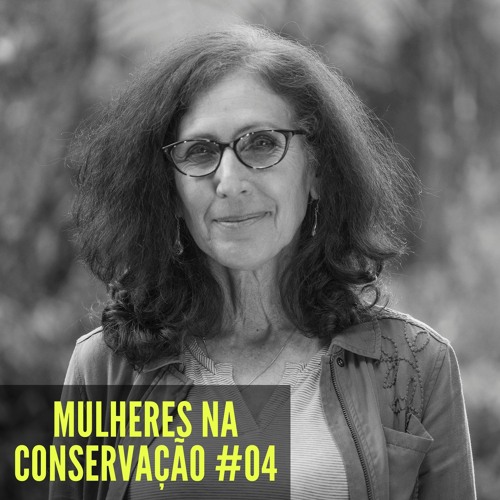 Mulheres na Conservação04 - Karen Strier - Como esta cientista trabalha para reabilitar o maior e mais raro macaco das AméricasAlém de descrever quase tudo que sabemos sobre o criticamente ameaçado muriqui-do-norte, o esforço de 38 anos de pesquisas de Karen Strier ajudou a recuperar uma população em Minas Gerais e deu esperança de um futuro para a espécie. Antropóloga, professora, presidente da Sociedade Internacional de Primatologia, Karen Strier é e um dos nomes mais reconhecidos da primatologia mundial e tivemos o prazer de acompanhá-la em campo.
---
Send in a voice message: https://podcasters.spotify.com/pod/show/mulheres-na-conservacao/message2020-03-0834 min
Mulheres na Conservação04 - Karen Strier - Como esta cientista trabalha para reabilitar o maior e mais raro macaco das AméricasAlém de descrever quase tudo que sabemos sobre o criticamente ameaçado muriqui-do-norte, o esforço de 38 anos de pesquisas de Karen Strier ajudou a recuperar uma população em Minas Gerais e deu esperança de um futuro para a espécie. Antropóloga, professora, presidente da Sociedade Internacional de Primatologia, Karen Strier é e um dos nomes mais reconhecidos da primatologia mundial e tivemos o prazer de acompanhá-la em campo.
---
Send in a voice message: https://podcasters.spotify.com/pod/show/mulheres-na-conservacao/message2020-03-0834 min People Behind the Science Podcast Stories from Scientists about Science, Life, Research, and Science CareersProtecting the World's Most Peaceful Primates - Dr. Karen StrierDr. Karen Strier is the Vilas Research Professor and Irven Devore Professor of Anthropology at the University of Wisconsin-Madison. Karen is a Primate behavioral ecologist. She is working to understand the biological basis of human behavior, evolution, and adaptation by studying our closest living relatives. Research in Karen’s group involves observing a critically endangered primate, the northern muriqui, in its natural habitat to understand how their behaviors are similar to or different from human behaviors. When she’s not in the lab or observing primates in the wild, Karen enjoys being outside, going for walks in nature, cooking deli...2019-04-1557 min
People Behind the Science Podcast Stories from Scientists about Science, Life, Research, and Science CareersProtecting the World's Most Peaceful Primates - Dr. Karen StrierDr. Karen Strier is the Vilas Research Professor and Irven Devore Professor of Anthropology at the University of Wisconsin-Madison. Karen is a Primate behavioral ecologist. She is working to understand the biological basis of human behavior, evolution, and adaptation by studying our closest living relatives. Research in Karen’s group involves observing a critically endangered primate, the northern muriqui, in its natural habitat to understand how their behaviors are similar to or different from human behaviors. When she’s not in the lab or observing primates in the wild, Karen enjoys being outside, going for walks in nature, cooking deli...2019-04-1557 min The PrimateCastFrom primate behavioral ecology to the faces in the forest with Dr. Karen StrierSend us a textThe PrimateCast has rolled out its mobile podcasting unit once again, this time to cover the joint meetings of the International Primatological Society and American Society for Primatologists held between August 21-27, 2016. This year's congress was hosted by the Lester E. Fisher Center for the Study and Conservation of Apes of Lincoln Park Zoo, and the conference was held at Navy Pier in Chicago, USA.The PrimateCast On Location at IPS 2016 with Dr. Karen StrierIn this edition, we sat down with Dr. Karen Strier, Vilas Research Professor and...2017-05-1315 min
The PrimateCastFrom primate behavioral ecology to the faces in the forest with Dr. Karen StrierSend us a textThe PrimateCast has rolled out its mobile podcasting unit once again, this time to cover the joint meetings of the International Primatological Society and American Society for Primatologists held between August 21-27, 2016. This year's congress was hosted by the Lester E. Fisher Center for the Study and Conservation of Apes of Lincoln Park Zoo, and the conference was held at Navy Pier in Chicago, USA.The PrimateCast On Location at IPS 2016 with Dr. Karen StrierIn this edition, we sat down with Dr. Karen Strier, Vilas Research Professor and...2017-05-1315 min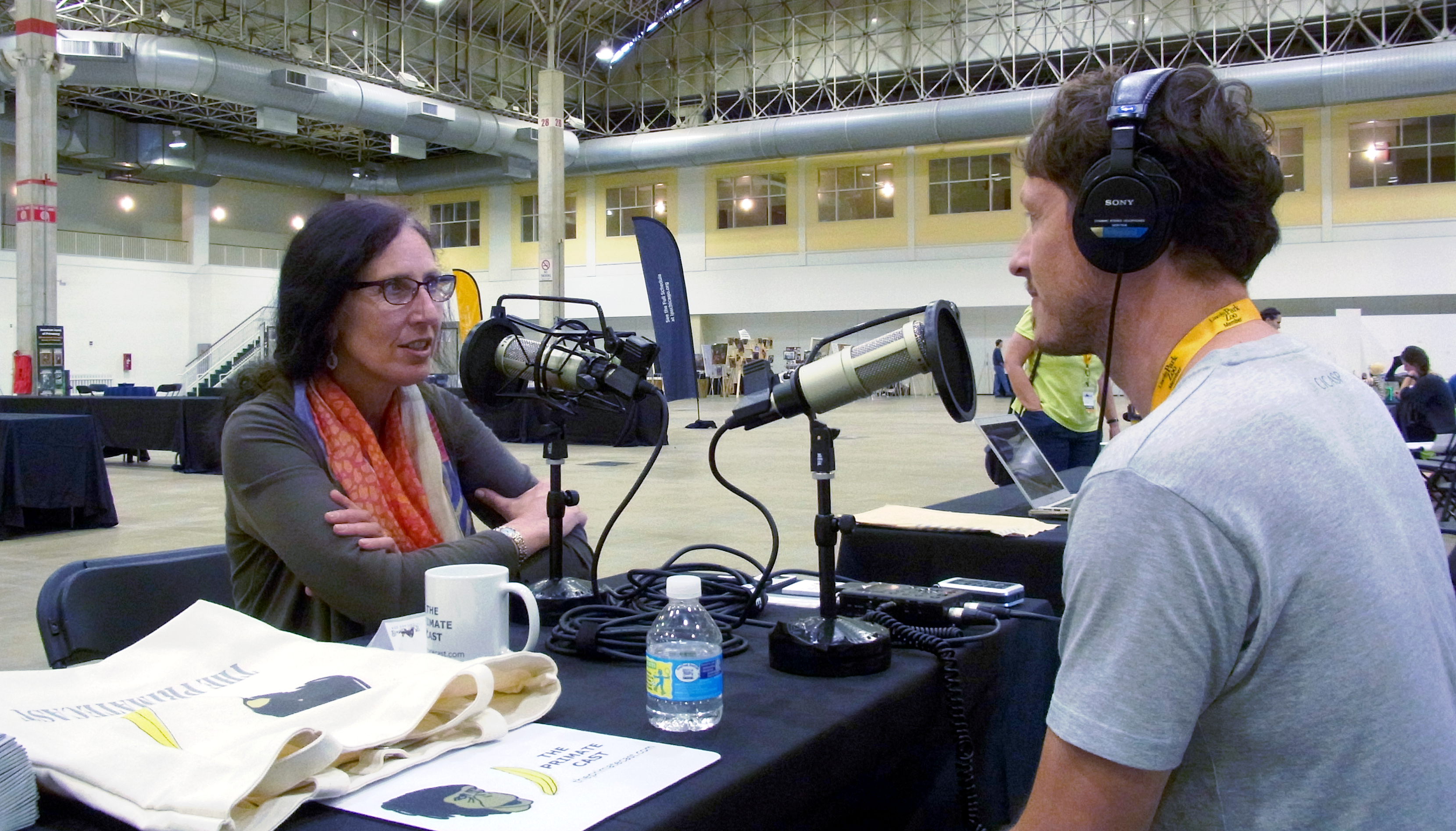 The PrimateCastThe PrimateCast #53: Talking Primate Behavioral Ecology with Dr. Karen StrierThe PrimateCast has rolled out its mobile podcasting unit once again, this time to cover the joint meetings of the International Primatological Society and American Society for Primatologists held between August 21-27, 2016. This year's...2017-05-1300 min
The PrimateCastThe PrimateCast #53: Talking Primate Behavioral Ecology with Dr. Karen StrierThe PrimateCast has rolled out its mobile podcasting unit once again, this time to cover the joint meetings of the International Primatological Society and American Society for Primatologists held between August 21-27, 2016. This year's...2017-05-1300 min The PrimateCastVoices from Chicago: A fun look back at the 2016 International Primatological Society meetingSend us a textThe PrimateCast has rolled out its mobile podcasting unit once again, this time to cover the joint meetings of the International Primatological Society and American Society for Primatologists held between August 21-27, 2016.This year's congress was hosted by the Lester E. Fisher Center for the Study and Conservation of Apes of Lincoln Park Zoo, and the conference was held at Navy Pier in Chicago, USA.The PrimateCast On Location at IPS 2016In this introductory podcast, we showcase a smattering of the many voices that could be heeard...2016-10-0449 min
The PrimateCastVoices from Chicago: A fun look back at the 2016 International Primatological Society meetingSend us a textThe PrimateCast has rolled out its mobile podcasting unit once again, this time to cover the joint meetings of the International Primatological Society and American Society for Primatologists held between August 21-27, 2016.This year's congress was hosted by the Lester E. Fisher Center for the Study and Conservation of Apes of Lincoln Park Zoo, and the conference was held at Navy Pier in Chicago, USA.The PrimateCast On Location at IPS 2016In this introductory podcast, we showcase a smattering of the many voices that could be heeard...2016-10-0449 min Center for Mind, Brain, and CultureThe Social Mind Conference (2 of 13) | Karen Strier | Exceptional Primates and the Insights that Change a FieldThe Social Mind: A Festschrift Symposium Honoring Prof. Frans B. M. de Waal (September 19, 2014) Sponsored by the Department of Psychology, Emory College of Arts and Sciences, Emory University.
If you would like to become an AFFILIATE of the Center, please let us know.Subscribe to our YouTube channel to get updates on our latest videos.Follow along with us on Instagram | Facebook NOTE: The views and opinions expressed by the speaker do not necessarily reflect those held by the Center for Mind, Brain, and Culture or Emory University.2014-09-1940 min
Center for Mind, Brain, and CultureThe Social Mind Conference (2 of 13) | Karen Strier | Exceptional Primates and the Insights that Change a FieldThe Social Mind: A Festschrift Symposium Honoring Prof. Frans B. M. de Waal (September 19, 2014) Sponsored by the Department of Psychology, Emory College of Arts and Sciences, Emory University.
If you would like to become an AFFILIATE of the Center, please let us know.Subscribe to our YouTube channel to get updates on our latest videos.Follow along with us on Instagram | Facebook NOTE: The views and opinions expressed by the speaker do not necessarily reflect those held by the Center for Mind, Brain, and Culture or Emory University.2014-09-1940 min Annual Reviews ConversationsAn Interview with Karen Strier (English)Karen Strier, Professor of Anthropology at the University of Wisconsin at Madison and Editorial Committee Member of the Annual Review of Anthropology, talks to Anna Rascouët-Paz about her work with the northern muriqui monkeys of Brazil.2013-02-0437 min
Annual Reviews ConversationsAn Interview with Karen Strier (English)Karen Strier, Professor of Anthropology at the University of Wisconsin at Madison and Editorial Committee Member of the Annual Review of Anthropology, talks to Anna Rascouët-Paz about her work with the northern muriqui monkeys of Brazil.2013-02-0437 min Annual Reviews ConversationsAn Interview with Karen Strier (Portuguese)Karen Strier, Professor of Anthropology at the University of Wisconsin at Madison and Editorial Committee Member of the Annual Review of Anthropology, talks to Anna Rascouët-Paz about her work with the northern muriqui monkeys of Brazil.2013-02-0437 min
Annual Reviews ConversationsAn Interview with Karen Strier (Portuguese)Karen Strier, Professor of Anthropology at the University of Wisconsin at Madison and Editorial Committee Member of the Annual Review of Anthropology, talks to Anna Rascouët-Paz about her work with the northern muriqui monkeys of Brazil.2013-02-0437 min Methods in Ecology and EvolutionMEE: The Primate Life History DatabaseKaren Strier, University of Wisconsin-Madison, USA, and Susan Alberts, Duke University, USA and Institute of Primate Research, Kenya, talk with Graziella Iossa, MEE Journal Co-ordinator, about their work with co-authors: The Primate Life History Database. This online database is based on long-term datasets that researchers at several institutions in North America have created to make data comparable across studies. It will aid future comparative analyses of primate data and the creation of easily archivable output. The most important features of this database, as Susan points out, are its structure and the use of a common vocabulary. Karen and Susan hope...2012-11-2106 min
Methods in Ecology and EvolutionMEE: The Primate Life History DatabaseKaren Strier, University of Wisconsin-Madison, USA, and Susan Alberts, Duke University, USA and Institute of Primate Research, Kenya, talk with Graziella Iossa, MEE Journal Co-ordinator, about their work with co-authors: The Primate Life History Database. This online database is based on long-term datasets that researchers at several institutions in North America have created to make data comparable across studies. It will aid future comparative analyses of primate data and the creation of easily archivable output. The most important features of this database, as Susan points out, are its structure and the use of a common vocabulary. Karen and Susan hope...2012-11-2106 min British Ecological SocietyMEE: The Primate Life History DatabaseKaren Strier, University of Wisconsin-Madison, USA, and Susan Alberts, Duke University, USA and Institute of Primate Research, Kenya, talk with Graziella Iossa, MEE Journal Co-ordinator, about their work with co-authors: The Primate Life History Database. This online database is based on long-term datasets that researchers at several institutions in North America have created to make data comparable across studies. It will aid future comparative analyses of primate data and the creation of easily archivable output. The most important features of this database, as Susan points out, are its structure and the use of a common vocabulary. Karen and Susan hope...2012-11-2106 min
British Ecological SocietyMEE: The Primate Life History DatabaseKaren Strier, University of Wisconsin-Madison, USA, and Susan Alberts, Duke University, USA and Institute of Primate Research, Kenya, talk with Graziella Iossa, MEE Journal Co-ordinator, about their work with co-authors: The Primate Life History Database. This online database is based on long-term datasets that researchers at several institutions in North America have created to make data comparable across studies. It will aid future comparative analyses of primate data and the creation of easily archivable output. The most important features of this database, as Susan points out, are its structure and the use of a common vocabulary. Karen and Susan hope...2012-11-2106 min